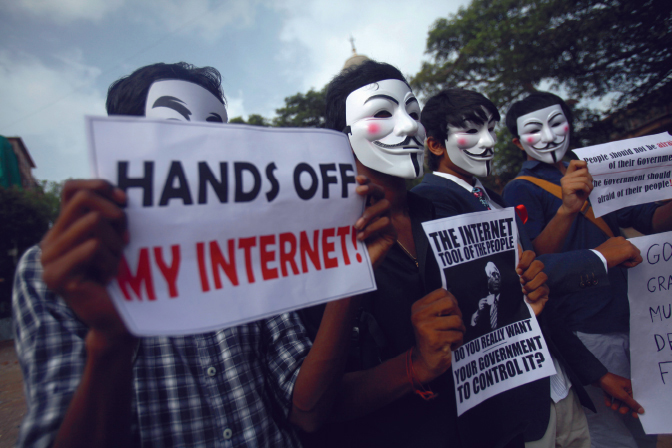Examining Ethics
EXAMINING ETHICS
The “Anonymous” Hackers of the Internet
Anonymous, the loosely organized hacktivist collective that would become known for its politically and socially motivated Internet vigilantism, first attracted major public attention in 2008.

The issue was a video featuring a fervent Tom Cruise—meant for internal promotional use within the Church of Scientology—that had been leaked to the Web site Gawker.When the church tried to suppress the video footage on grounds of copyright, Anonymous went to work. They launched a DDoS, or Distributed Denial of Service, attack (flooding a server or network with external requests so that it becomes overloaded and slows down or crashes) on the church’s Web sites, bombarded the church headquarters with prank phone calls and faxes, and “doxed” the church by publishing sensitive internal documents.
United by their libertarian distrust of government, their commitment to a free and open Internet, their opposition to child pornography, and their distaste for corporate conglomerates, Anonymous has targeted organizations as diverse as the Indian government (to protest the country’s plan to block Web sites like The Pirate Bay and Vimeo) and the agricultural conglomerate Monsanto (to protest the company’s malicious patent lawsuits and the company’s dominant control of the food industry). As Anonymous wrote in a message to Monsanto:
You have continually introduced harmful, even deadly products into our food supply without warning, without care, all for your own profit. … Rest assured, we will continue to dox your employees and executives, continue to knock down your Web sites, continue to fry your mail servers, continue to be in your systems …1
While Anonymous agrees on an agenda and coordinates the campaign, the individual hackers all act independently of the group, without expecting recognition. A reporter from the Baltimore Sun aptly characterized Anonymous as “a group, in the sense that a flock of birds is a group. How do you know they’re a group? Because they’re traveling in the same direction. At any given moment, more birds could join, leave, peel off in another direction entirely.”2
In some cases, it’s easy to find moral high ground in the activities of hacktivists. For example, Anonymous reportedly hacked the computer network of Tunisian tyrant Zine el-Abidine Ben Ali; his downfall in 2011 was the first victory of the Arab Spring movement. In 2011, Anonymous also hacked the Web site of the Westboro Baptist Church, known for spreading its extremist antigay rhetoric, picketing funerals of soldiers, and desecrating American flags. And in The Girl with the Dragon Tattoo book and film series, it is hard not to cheer on the master hacker character Lisbeth Salander as she exacts justice on criminals and rapists. In a world of large, impersonal governments and organizations, hackers level the playing field for the ordinary people, responding quickly in ways much more powerful than traditional forms of protest, like writing a letter or publicly demonstrating in front of headquarters or embassies. In fact, hacktivism could be seen as an update on the long tradition of peaceful protests.
Yet, hackers can run afoul of ethics. Because the members of Anonymous are indeed anonymous, there aren’t any checks or balances on those who “dox” a corporate site, revealing thousands of credit card or Social Security numbers and making regular citizens vulnerable to identity theft and fraud, as some hackers have done. Prosecutions in 2012 took down at least six international members of Anonymous when one hacker, known online as Sabu, turned out to be a government informant. One of the hackers arrested in Chicago was charged with stealing credit card data and using it to make more than $,000 in charges.3 Just a few “bad apples” can undermine the self-managed integrity of groups like Anonymous.
The very existence of Anonymous is a sign that many of our battles now are in the digital domain. We fight for equal access and free speech on the Internet. We are in a perpetual struggle with corporations and other institutions over the privacy of our digital information. And, although our government prosecutes hackers for computer crimes, governments themselves are increasingly using hacking to fight each other. For example, the United States has used computer viruses to attack the nuclear program of Iran. Yet this new kind of warfare carries risks for the United States as well. As the New York Times, which broke the story of cyberattacks against Iran, noted, “no country’s infrastructure is more dependent on computer systems, and thus more vulnerable to attack, than that of the United States.”4